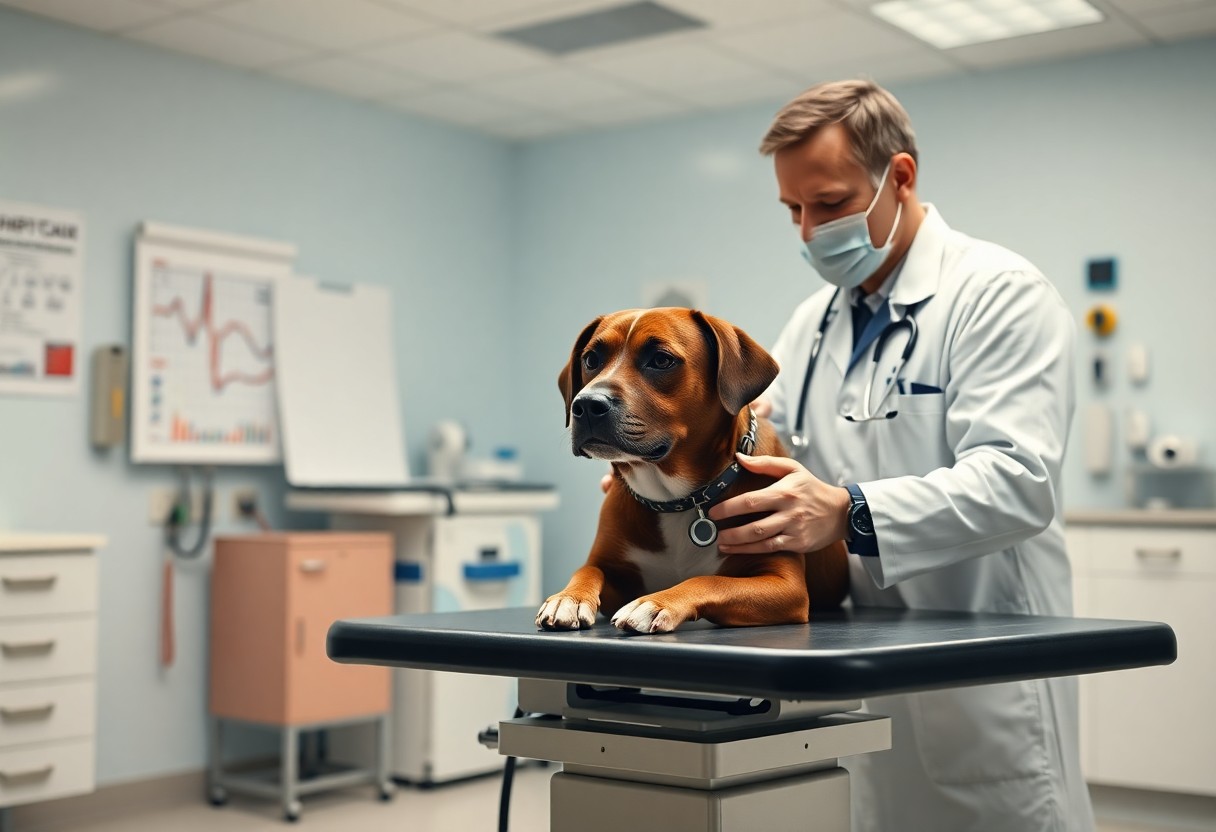Over the course of your pet’s life, an annual checkup plays a vital role in maintaining their overall health and detecting any potential issues early on. During this routine examination, your veterinarian will conduct a thorough physical assessment, including checking your pet’s weight, coat, and dental health. They may also recommend vaccinations and screen for common diseases, ensuring your furry friend stays healthy and happy. Understanding what occurs during this visit will help you to appreciate its significance and advocate for your pet’s well-being.
The Vital Role of Preventive Health Care
Your pet relies on you to provide not only food and shelter but also the crucial care that keeps them healthy throughout their life. Engaging in preventive health care during the annual checkup is fundamental to this process. Regular veterinary visits allow professionals to monitor your pet’s health closely, making note of any changes that might indicate underlying health issues. Catching potential problems before they escalate can spare your pet unnecessary suffering and save you significant expenses, as treatment outcomes are often more favorable when issues are detected early.
Additionally, these checkups assist in maintaining your pet’s vaccinations, parasite control, and dental health. Consistent management in these areas can lead to a longer, more fulfilling life. For instance, keeping up with vaccinations not only protects your pet but also helps prevent outbreaks of diseases within the community. Coupled with spaying or neutering and overall health monitoring, preventive care can significantly reduce the risk of chronic health problems or lifestyle-related diseases down the road.
Long-term Benefits of Regular Checkups
Taking your pet for annual checkups ensures that you set a foundation for long-term health benefits. Pets who receive routine examinations are more likely to enjoy a prolonged lifespan, often living several years longer than pets who do not receive regular care. The significance of early intervention cannot be overstated; it’s often the key to diagnosing conditions like diabetes or kidney disease before they severely impact your pet’s quality of life. By establishing a relationship with your veterinarian and adhering to a consistent checkup schedule, you also create an opportunity for tailored health advice suited to your pet’s specific needs.
Moreover, behavioral assessments often accompany physical examinations during these checkups, enabling you to address any issues like anxiety or aggression that might affect your pet’s happiness and your household harmony. Investing time in these annual visits can help ensure that your pet flourishes both physically and mentally over their lifetime.
Common Health Issues Detected Early
Annual checkups reveal common health issues that may otherwise go unnoticed, allowing for prompt intervention. Conditions such as dental disease, obesity, and skin allergies are frequently identified during these visits. For example, many pets suffer from undetected dental issues, which can lead to pain and infection. With your vet’s guidance, you can implement effective dental care strategies to mitigate these risks. Obesity, another growing problem, is typically easy to spot during a vet visit, enabling you to create a manageable diet and exercise plan tailored to your pet’s needs.
Beyond these common concerns, checkups can uncover more serious health conditions such as heart disease, cancers, or metabolic disorders. For instance, regular bloodwork can help identify abnormal kidney or liver values early on. Pets experiencing subtle behavioral changes might also be suffering from conditions like hyperthyroidism, which can be addressed faster through proactive care. Overall, those who invest in preventive health care through yearly checkups effectively safeguard their pet’s health and enhance their overall well-being.
The Step-by-Step Checkup Experience
| Step | Description |
|---|---|
| Initial Consultation and Medical History Review | Your veterinarian starts by discussing any changes in your pet’s health, behavior, diet, and environment since the last visit. |
| Physical Examination Breakdown | This thorough assessment covers various aspects of your pet’s health, from weight check to dental health evaluations. |
| Diagnostic Tests | Depending on your pet’s age and health, tests like blood work or fecal exams may be recommended. |
| Vaccination Updates | Based on your pet’s lifestyle and health needs, your vet will discuss any necessary vaccinations. |
| Preventative Care Recommendations | Your vet will guide you on nutrition, weight management, and other lifestyle factors to maintain your pet’s health. |
Initial Consultation and Medical History Review
The checkup begins with an initial conversation. During this time, you’ll share any observations regarding your pet’s behavior or physical condition that could indicate health changes. This includes noting any weight fluctuations, changes in appetite, or unusual behaviors. Without this information, your vet might miss critical insights about your pet’s health. By collaborating closely, you help create a clearer picture of your pet’s well-being.
Your veterinarian will also review your pet’s medical history, including previous illnesses, surgeries, or treatments. This helps the vet understand pre-existing conditions that could influence your pet’s health assessments and treatment options. Keeping detailed records and sharing this information ensures a comprehensive approach to your pet’s care.
Physical Examination Breakdown
The physical examination is a comprehensive evaluation that includes assessing your pet’s overall body condition, coat quality, and eye clarity. Vets carefully examine the ears for debris or infection, palpate the abdomen to check for organ condition or abnormalities, and listen to the heart and lungs for any irregularities in rhythm or rate. These evaluations are not mere formalities; they can help detect serious conditions early, potentially saving your pet’s life.
Your vet will also check dental health, since periodontal disease is a common yet often overlooked issue affecting pets. Not only can dental problems lead to pain and difficulty eating, but they can also contribute to kidney or heart diseases. A complete oral examination allows for timely intervention, whether it leads to a simple cleaning or more extensive dental care.
Physical examinations cover a lot of ground, including checking the lymph nodes, assessing skin and fur for signs of allergies or parasites, and evaluating joint health for signs of arthritis or mobility issues. All of these components are integral in formulating a health plan tailored to your pet’s specific needs. This detailed breakdown ensures that you are always informed and that your pet receives personalized care throughout their life.
Diagnostic Tests: What to Expect
During your pet’s annual checkup, diagnostic tests play an important role in evaluating their health and identifying any underlying issues. These assessments allow the veterinarian to tailor recommendations and treatment plans based on your pet’s specific needs. Common tests may include blood work, urinalysis, and fecal exams to screen for various conditions and assess organ functions. Your vet may also suggest additional tests based on your pet’s age, breed, and any symptoms they may present.
Essential Laboratory Tests
Blood tests are among the most important diagnostics performed during your pet’s checkup. They help the vet evaluate kidney and liver function, check for anemia, and identify infections or inflammatory diseases. A complete blood count (CBC) and a serum biochemistry panel provide a wealth of information about your pet’s overall health status. Regular screenings can catch potential health risks early, making it easier to treat issues before they escalate.
Urinalysis and fecal assessments are equally important laboratory tests. A urinalysis can reveal signs of diabetes, urinary tract infections, and other conditions by analyzing various parameters in your pet’s urine. Similarly, fecal exams test for parasites, which can lead to weight loss, vomiting, and other digestive issues. Ensuring your pet undergoes these tests regularly will help maintain their wellbeing and promote a longer, healthier life.
Imaging Procedures: When Are They Necessary?
Imaging procedures, such as X-rays or ultrasounds, become important tools when your vet needs a closer look at your pet’s internal structures. If your pet exhibits symptoms like persistent vomiting, difficulty breathing, or unexplained weight loss, imaging can help identify potential hazards like tumors, fractures, or organ abnormalities. Vets may recommend these advanced diagnostic techniques based on physical examination findings or laboratory test results that warrant further investigation.
Many pet owners find imaging is a next step after initial tests indicate something concerning. For example, an unexplained drop in energy levels paired with abnormal blood work might lead your vet to suggest X-rays to scan for possible heart, lung, or abdominal issues. While imaging procedures involve additional costs, they often prove invaluable in obtaining a definitive diagnosis and developing an effective treatment plan for your furry companion.
Vaccinations and Preventive Treatments
During your pet’s annual checkup, vaccines play a vital role in sustaining their health and ensuring they remain protected against common, yet potentially serious, diseases. Each year, your veterinarian will review and recommend these routine vaccinations based on your pet’s age, lifestyle, and health status. Common vaccines for dogs include those for parvovirus, distemper, adenovirus, and rabies, while cats often receive vaccines for feline herpesvirus, calicivirus, panleukopenia, and rabies. Your vet’s assessment may lead to updates in vaccination schedules, particularly if your pet has had any health changes since their last visit or if you travel or board your pet frequently.
Routine Vaccination Protocols
Each vaccination serves a unique purpose, assisting in the prevention of diseases that could otherwise have severe health implications for your pet. For instance, the rabies vaccine not only protects against a deadly virus but is also a legal requirement in many regions. Assessing your pet’s lifestyle can help fine-tune the vaccination timeline; for example, a dog that frequently interacts with other animals at dog parks might need additional vaccinations, such as the kennel cough vaccine.
Boosters may also be necessary. Vaccines are not always one-and-done; many require a booster shot to ensure your pet maintains optimal immunity. It’s common for core vaccines to be given every one to three years depending on the vaccine and your pet’s health history. Keeping a detailed record of your pet’s vaccination history also aids your veterinarian’s assessments in providing the best preventive care.
Parasite Control and Preventive Medications
Your vet will also discuss parasite control, which is an imperative component of your pet’s overall health care regimen. Fleas, ticks, and worms pose significant risks to your pet’s health, often leading to more serious conditions if left unaddressed. Your veterinarian may recommend a year-round preventive treatment plan, particularly if your pet spends considerable time outdoors. Medication options vary, including topical treatments, oral tablets, or even injections, making it easy to find a suitable choice for your pet.
A typical plan includes a monthly oral or topical flea and tick preventative, as well as deworming treatments that help protect against intestinal parasites like roundworms and tapeworms. Regular checks for parasites, such as fecal exams, help ensure that your pet is not harboring any infestations that could affect their well-being. By committing to these preventive measures, you significantly reduce the risk of your pet suffering from related health issues down the line.
Staying on top of parasite prevention is especially important as some parasites can transmit diseases not only to pets but to humans as well. For instance, ticks can carry Lyme disease, a potentially serious illness that affects both animals and people. By collaborating with your veterinarian on a proactive approach, you’re setting the groundwork for a healthier, happier life for your beloved pet.
Post-Checkup Recommendations and Follow-Up Care
Understanding Your Pet’s Health Report
Your veterinarian will provide a comprehensive health report following your pet’s checkup, detailing findings from the physical exam as well as results from any diagnostic tests. This report outlines areas of concern, vaccination status, and any observed changes in weight or behavior that could indicate a developing health issue. Pay close attention to noted values, such as blood test results or urinalysis outcomes; these numbers can reveal underlying conditions that may need monitoring. Use this report not just as a summary but as a roadmap for your pet’s health journey.
Implementing Lifestyle Changes and Routine Monitoring
Final Words
The annual checkup for your pet is an imperative component of their long-term health and wellbeing. During this visit, your veterinarian conducts a thorough examination that assesses your pet’s overall condition, including their weight, dental health, and specific needs based on their age and breed. This allows for early detection of any potential health issues, so you can address them before they become more serious. Additionally, your veterinarian may recommend vaccinations and preventive treatments tailored to your pet’s lifestyle and environment, ensuring they remain protected against common diseases.
Engaging in this yearly routine not only helps maintain your pet’s health but also fosters a strong bond between you and your veterinarian. By discussing any behavioral changes, dietary needs, or other concerns during the visit, you can collaborate on a plan that supports your pet’s health journey. Your active participation in these appointments is vital; it empowers you to make informed decisions about your pet’s care at home and enhances their quality of life for many years to come.







